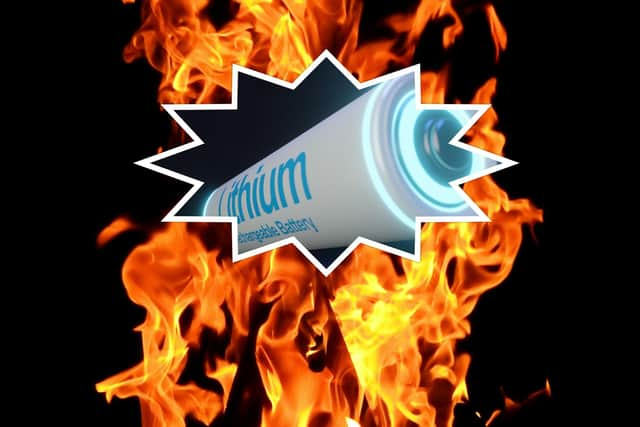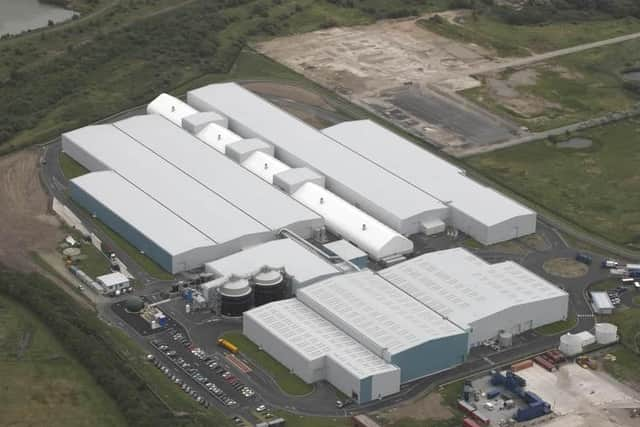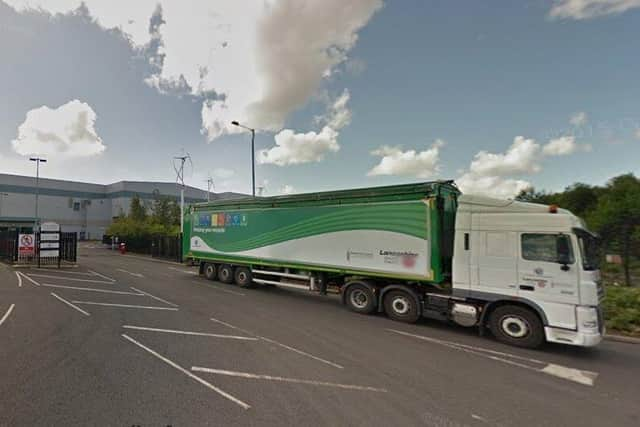Warning of 'major tragedy' after multiple fires caused by badly-disposed lithium batteries at Lancashire waste sites
and live on Freeview channel 276
It comes after a series of blazes at the county council’s two waste recovery parks. Fires have broken out at the facilities in Farington and Thornton as a result of battery-powered items being thrown away with other household waste or recycling.
The chair of the Lancashire Combined Fire Authority, County Cllr David O’Toole, told a full council meeting at County Hall that he feared “a massive tragedy” was going to occur - and called on the government to introduce legislation regulating “the sale and disposal of these very dangerous items”.
Advertisement
Hide AdAdvertisement
Hide AdLIthium batteries are rechargeable and are found in a wide range of popular products, including mobile phones, laptops, e-scooters and e-bikes.


Guidance from Lancashire Fire and Rescue Service states that batteries should be removed from electrical items, where possible, and recycled separately at a dedicated collection point. If a battery cannot be taken out of the product it has powered, the whole item should be taken to one of the county’s local recycling centres where it can be dealt with safely.
However, County Cllr O’Toole said there was nothing currently stopping people throwing the blaze-inducing batteries away “anywhere you like”. He asked Lancashire County Council's cabinet member for environment and climate change, Shaun Turner, to request the authority writes to the government to ask them to consider bringing in a new law about where such batteries can be disposed.
County Cllr Turner said he would be happy to discuss the matter and added that a public information campaign was already under way. He said “the simplest solution” would be to introduce separate doorstep collections of batteries, but warned of a “long journey that will require continued commitment and focus before any significant improvements can be observed”.


Advertisement
Hide AdAdvertisement
Hide AdHe also told the meeting that the dangers of lithium batteries turning up in the so-called “co-mingled” general waste at the Farington site, on Sustainability Way, and the Thornton facility, on Bourne Road, were two fold.
“[There is a] risk to property and [a] risk to people - mainly our staff, who operate and maintain our two waste recovery parks, [but also] people [living in] the residential properties close by and staff of industrial properties that border our two [facilities],” County Cllr Turner explained.
The warning was set against the backdrop of the number Lancashire household fires caused by lithium batteries having more than doubled in just two years - from 14 in 2020/21 to 35 in 2022/23. Three in four of the incidents involved a charger.
When batteries are charged in communal areas or escape routes, any fire can quickly block the way out. Batteries can sometimes fail catastrophically, leading to explosions and rapidly developing fires.


Advertisement
Hide AdAdvertisement
Hide AdCounty councillors were told that there had been significant investment in fire detection and firefighting equipment at Lancashire’s waste recovery parks - with more being considered - and heard that standard waste management and inspection processes also helped.
Farington will soon see operational changes, like those already introduced at Thornton, which involve greater use of waste processing equipment.
HOW TO STAY SAFE AT HOME WITH LITHIUM BATTERIES
As well as not throwing lithium batteries away with general waste, Lancashire Fire and Rescue Service’s ‘Charge Smart, Stay Safe’ campaign advises residents to:
***always buy electrical items and chargers from a trusted retailer;
Advertisement
Hide AdAdvertisement
Hide Ad***buy replacement batteries and chargers from the manufacturer;
***never charge lithium batteries on an escape route; if possible, charge and store them away from living areas;
***never charge lithium batteries when you are sleeping, or if you are leaving the home;
***always dispose of defective batteries by recycling them at waste recycling centres;
***ensure you have working smoke alarms on every floor.